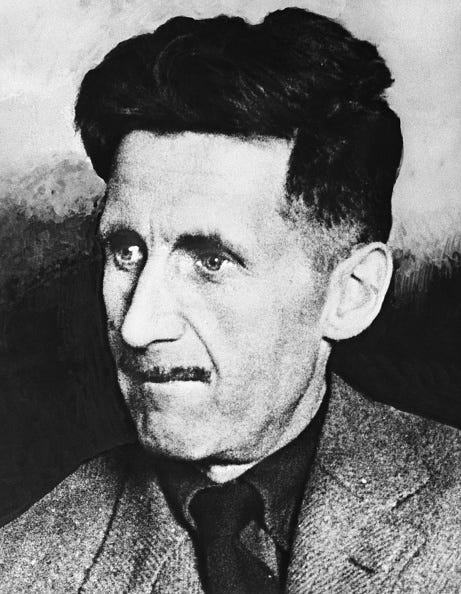“Sunday Morning Early” by David Romtvedt from Dilemmas of the Angels. © Louisiana State University Press, 2017.
ORIGINAL TEXT AND AUDIO - 2017
Today is the birthday of the man who wrote, “In a time of universal deceit, telling the truth is a revolutionary act.” That’s George Orwell, born Eric Blair in Motihari, India (1903). He wrote his first poem — which he dictated to his mother — at the age of four or five. He was 11 when he wrote a patriotic poem after World War I broke out. It was published in the newspaper. He wrote a short story that he described as “a ghastly failure,” and a rhyming play, and helped edit the school’s newspaper. He was also constantly narrating his own actions in a writerly way, in his head. “I had the lonely child’s habit of making up stories and holding conversations with imaginary persons,” he later wrote, “and I think from the very start my literary ambitions were mixed up with the feeling of being isolated and undervalued.” His father was a civil servant, and the family was, in Orwell’s words, “lower-upper-middle class.” Orwell received a scholarship to Eton, the prestigious boys’ school, but he felt alienated from his wealthy classmates. He opted not to go on to Oxford or Cambridge, but served as a military policeman in Burma instead. His essay “A Hanging,” which he published in 1931, is about his time there; it describes his role in the execution of a prisoner.
He believed there were four great motives for writing prose: sheer egoism, aesthetic enthusiasm, historical impulse, and political purpose. By “political,” he meant in the widest sense of the word: “Desire to push the world in a certain direction, to alter other peoples’ idea of the kind of society that they should strive after. Once again, no book is genuinely free from political bias. The opinion that art should have nothing to do with politics is itself a political attitude.” His writing was pushed even more toward the political after Hitler’s rise to power, and the Spanish civil war. He said, “Every line of serious work that I have written since 1936 has been written, directly or indirectly, against totalitarianism and for democratic socialism, as I understand it.” In the early 1940s, he began work on a novella about a group of farm animals that decide to stage an uprising against their tyrannical farmer. Orwell called it Animal Farm (1945), and often described it as a satirical tale against Stalin and the Soviet Union.
“What I have most wanted to do throughout the past ten years is to make political writing into an art,” he wrote in his essay “Why I Write” (1946). “My starting point is always a feeling of partisanship, a sense of injustice. When I sit down to write a book, I do not say to myself, ‘I am going to produce a work of art.’ I write it because there is some lie that I want to expose, some fact to which I want to draw attention, and my initial concern is to get a hearing. But I could not do the work of writing a book, or even a long magazine article, if it were not also an aesthetic experience. […] Animal Farm was the first book in which I tried, with full consciousness of what I was doing, to fuse political purpose and artistic purpose into one whole. I have not written a novel for seven years, but I hope to write another fairly soon. It is bound to be a failure, every book is a failure, but I do know with some clarity what kind of book I want to write.” His next — and final — novel was Nineteen Eighty-Four (1949), about a future in which England has become a totalitarian state run by an anonymous presence known only as Big Brother. Orwell died of tuberculosis just a few months after it was published. Far from being a failure, Nineteen Eighty-Four has been translated into 62 languages, has sold millions of copies, and just this past January it was No. 1 on Amazon.com’s best-seller list.
A federal minimum wage law guaranteeing workers 25 cents an hour was established on this day in 1938. Passed as the Fair Labor Standards Act, it also capped regular weekly working hours to 40, banned child labor, and instituted time-and-a-half pay for overtime.
President Franklin Roosevelt had been campaigning for reelection when a young girl trying to pass him a note was held back by police. When he had someone retrieve the letter, it read, “I wish you could do something to help us girls.” She described her pay in a sewing factory as just $4 per week. Roosevelt decided then that he needed to act on child labor and minimum wage laws.
The first minimum wage law had been enacted in New Zealand in 1894. Several other countries adopted the practice before the United States. Since its inception in 1938, the federal U.S. wage has been adjusted 22 times by 12 different presidents — most recently by President Obama, who raised it to $7.25/hour in 2009. Minimum wage does not increase automatically with inflation over time, but rather must be adjusted intentionally by a sitting president and the administration.
Most states have their own minimum wage laws, with the exception of Louisiana, Mississippi, Tennessee, Alabama, and South Carolina. Several states have wage rates lower than the federal rates. The highest minimum wage is $9.32 in Washington State.
Be well, do good work, and keep in touch.®
**Help support this The Writer’s Almanac Anniversary newsletter by clicking the Subscribe button and opting into the paid Subscription (there is no additional benefit here but it is a way to support the free newsletter).
**Or send support through our store online - CLICK HERE





Vermont's minimum wage is: $13.XX/hour